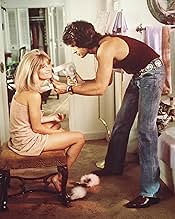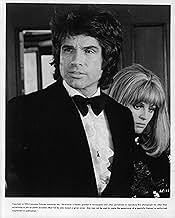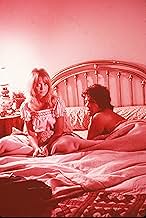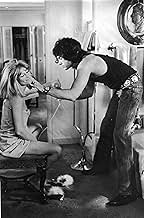El día de las elecciones de 1968, un peluquero mujeriego está demasiado ocupado cortando pelo y lidiando con sus diversas novias y su amante, cuyo marido conoce y descubre que tiene una aven... Leer todoEl día de las elecciones de 1968, un peluquero mujeriego está demasiado ocupado cortando pelo y lidiando con sus diversas novias y su amante, cuyo marido conoce y descubre que tiene una aventura con su ex novia.El día de las elecciones de 1968, un peluquero mujeriego está demasiado ocupado cortando pelo y lidiando con sus diversas novias y su amante, cuyo marido conoce y descubre que tiene una aventura con su ex novia.
- Ganó 1 premio Óscar
- 3 premios ganados y 11 nominaciones en total
- Dirección
- Guionistas
- Todo el elenco y el equipo
- Producción, taquilla y más en IMDbPro
Opiniones destacadas
Here in the updated "Shampoo", Beatty and Towne make the hero an assumed-to-be-gay hairdresser (instead of impotent)and the results are inspired bedroom farce mixed with social satire.
Younger viewers may find the film a little dated but it was a "period" film when it was made (set in 68 when it was shot in 74) so Ashby consciously gave it that dated look. For me this and Heaven Can Wait are Beatty's best work. Walks a fine comic/tragic line. And this really feels like the closest character to Beatty's heart. It was after this that I went back and saw Splendor in the Grass and began to appreciate Beatty as an actor rather than just a gigolo celebrity.
Great dialogue by Towne, Jack Warden's hilarious and Julie Christie is stunning.
Yet, I cannot blame this film for what it does well, which is portray the life of a man who simply wants a good time and success and an accurate picture of the times of 1968 when Nixon was about to be elected, the Summer of Love was almost upon us and free love was a progressive idea. Yet, this movie seems harder on these characters than would be let on. Perhaps it is a nostalgic look-back to a time when there was a great feeling of new-found freedom but these people didn't know what to do with it. Some also criticize it for being chauvinistic but in reality, the females are the most confident, the most aware of their situations and the only ones able to make sense of what the next step should be.
As you might expect, the acting is very good with Beatty playing the character completely aloof, always in his own world trying to think faster than the situations being thrown at him. He realizes what a mess he's in but also knows he doesn't want out so easy. Goldie Hawn is a wonderful, charming and confident actress whose beauty is secondary to her talent while Julie Christie gives the film's best performance as a conflicted woman who seems to know exactly what she will do despite not letting on. The Academy Awards only recognized Lee Grant and Jack Warden, perhaps because they represent a past age, a world about to get completely swept up in the new era being established during the '60s.
Some see it as a political satire, others see it as an unfunny comedy about the consequences of free love. I see it as both as well as a very smart character study of what not to do but also why it's so fun doing it.
Beatty has never been more charming - or revealing as emptily vain as anyone so "successful" with women can become, and the film switches between surprisingly adult material even for now with a concern for mid-life crises, cultural politics, and ultimately, a cynical view of how the free-wheeling 60s counterculture didn't take themselves seriously enough. Robert Towne's influence in the script is clearly evident.
Already "dated" when it came out, it's a great snapshot of the times, its concerns and issues, and is relevant today.
Shampoo is a sex comedy in that most, if not all, of its jokes revolve around sex, or at least the implication that sex has taken place or might be about to take place. As a result it is arguable that the comedy is a bit thin and repetitive, and it is true that the story is hardly bursting with riotous wit. And yet ace screenwriter Robert Towne constructs situations that are funny in their believable social awkwardness. They might only raise a chuckle or two over the course of a scene, but they have an almost soap opera quality which keeps us watching. Besides, there's a bit more going on here than bedroom humour. The decision to set it seven years in the past seems strangely arbitrary at first, but it has a surprisingly moving impact when political events start to creep into the narrative, and Warren Beatty's womanising antics are put into some perspective.
Like all comedies, a lot of its success or otherwise depends on the acting performances. This was largely an age of realism in acting, but here the performances are just on the comedic side of real. Nobody does anything which is exactly funny in its own right, but it often is funny in its timing and context. For example, there is Beatty's mumbled excuse to Carrie Fisher (whom he has just had sex with) when he is dragged off by Lee Grant (who intends to have sex with him). Similarly, a lot of Jack Warden's self-important manliness is funny in the context of the fact that Beatty is busy screwing his wife, mistress and teenage daughter. Lee Grant gives another of her typically attention-grabbing minor roles, the authoritative society lady one minute, girlishly sipping a soft drink through a straw the next. Returning to Beatty, I'm also vaguely amused by the way he emphasises the last syllable in "pancreas" during the first scene, as if it's some kind of ass.
The director here is Hal Ashby, a really fine craftsman of 70s cinema with a deceptively simple approach. He doesn't move the camera much, and often keeps back a bit from the action, not in a cold, distant way but more to show everything that is going on in a scene and allow the actors' body language to come across as well as facial expression. This is even effective for the comedy, such as in the scene where Beatty trashes the bin outside the bank, in which the wide shot makes him look somewhat pathetic in his anger. When Ashby does move the camera it is usually to give an impression a setting or situation, often with beautiful economy, and nearly always disguised by following the movement of a character. Take the shot which introduces Jack Warden's home life. He enters from one end of the room, kisses his daughter in mid-shot and surrounded by lots of colour. Then as he crosses what turns out to be a rather large room, the camera wheels round, to reveal his wife sitting alone amid stark white furnishings. An editor before he took up directing, Ashby clearly knows the potentially comedic value of a well-timed crosscut. For example, after the scene in which Warden discusses whether or not Beatty is "a fairy", we cut to a shot of Beatty blow-drying a woman's hair, her face virtually in his crotch.
But there is one thing that makes Shampoo really stand out, and this is something which comes both from Ashby's direction and the Towne/Beatty screenplay: Despite coming from a more liberated era, it still has the artful good taste of the sex comedies of the 30s. It resists the temptation to become soft porn or a string of gross-out jokes. There is only a little partial nudity, and for the most part we do not see much of the sex acts, only their beginnings and aftermaths. And this is an era in which a fairly graphic sex scene was fast becoming a staple of any romantic movie. Despite its being a comedy almost wholly concerned with one man's sexual adventures, Shampoo is a surprisingly mature and refreshingly intelligent motion picture.
¿Sabías que…?
- TriviaLovers off and on since 1967, Warren Beatty and Julie Christie broke up for good during the making of this movie. They remained friends and later worked together in El cielo puede esperar (1978).
- ErroresThe Coca-Cola can George drinks from while chatting with Lorna is a post-1968 design.
- Citas
George Roundy: Can't we just, eh, be friends?
Lorna: Okay.
[teen-aged Lorna makes George an offer he can't refuse]
Lorna: You wanna fuck?
- Créditos curiososIn the opening credits, horror film producer/actor William Castle is billed as "Bill Castle," but in the end credits he is back to "William Castle."
- ConexionesFeatured in Precious Images (1986)
- Bandas sonorasWouldn't It Be Nice
(1966) (uncredited)
Music by Brian Wilson
Lyrics by Tony Asher, Mike Love and Brian Wilson
Performed by The Beach Boys
Selecciones populares
- How long is Shampoo?Con tecnología de Alexa
Detalles
- Fecha de lanzamiento
- País de origen
- Idioma
- También se conoce como
- Sosyete kuaförü
- Locaciones de filmación
- 2270 Bowmont Drive, Beverly Hills, California, Estados Unidos(Jackie's House at Bowmont & Hazen)
- Productoras
- Ver más créditos de la compañía en IMDbPro
Taquilla
- Presupuesto
- USD 4,000,000 (estimado)
- Total en EE. UU. y Canadá
- USD 49,407,734
- Total a nivel mundial
- USD 49,407,734
Contribuir a esta página


































